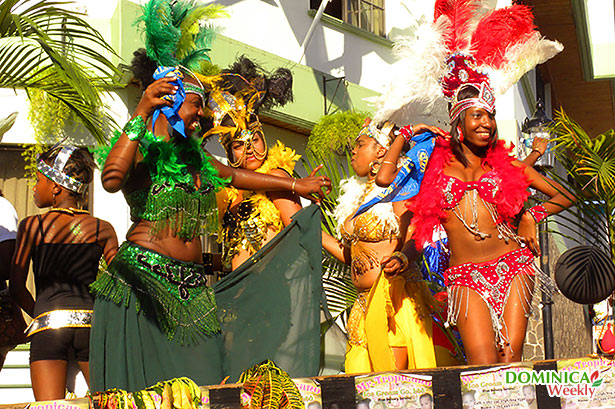New Year’s
Day (January 1): To do a simple search on how people from Dominica celebrate
New Year’s Eve and/or New Year’s Day was not simple at all. For one, I kept
coming up with info for the Dominican Republic. And two, I found a lot of
tourist suggestions if you were going to go visit, but nothing New Year’s
specific. So, I’m going to go out
on a limb and assume that they celebrate it in similar ways that the rest of us
bring in the New Year. I did
read that many people start off the celebrations by going to church and then following
that with all of the typical celebrations, including a lot of dancing.
Carnival
Monday (varies, February/March): Dominica
celebrates Carnival (also known as Mas Domnik) for two days, the Monday and
Tuesday before Ash Wednesday. Most
of the largest celebrations are held in the capital city of Roseau. Dominicans did borrow some elements
from Martinique and Guadeloupe as well as Trinidad. Some of the main celebrations that are held year after year
include a special opening ceremonies, music competitions, parades, and beauty
contests.
Good Friday /
Easter / Easter Monday (varies, March/April): This is an important holiday weekend for many Dominican
Christians. Again, it was hard to find information that was relevant to
Dominica and their Easter traditions.
Since it is an English-speaking country, I’m guessing that they also
have the tradition of eating hot cross buns, like other Caribbean
English-speaking islands do. Good
Friday is generally treated as a day of solemnity. People may attend special Good Friday services at their
church. Easter is far more joyous and usually starts off with church services,
followed by an elaborate luncheon of fish, bread, and a variety of fruits.
Easter egg hunting isn’t really done like it is in the US and parts of Europe
(probably because of the heat and spoilage), but many islands have a tradition
of kite flying on the beach.
Easter Monday is usually spent as a day of relaxation, partaking in some
sort of recreation with family and friends.
Whit Monday
(varies, May/June): Traditionally, this is the day that falls 50 days after
Easter in which Christians believe is the day that the Holy Spirit came to
Jesus’ disciples to give them the gift of tongues. On this day, many Christians will attend special church
services and special hymns are sung.
Emancipation
Day (first Monday in August): This
holiday is primarily celebrated in the former British colonies of the Caribbean
and celebrates the emancipation of the slaves. This year, there was a special
monument put up with a special concert ensuing afterwards. People usually take this time to
reflect upon Dominica’s history and give some sort of homage to their
forefathers.
Independence
Day (November 3): This is the day
that Dominicans celebrate their independence from Britain. It always includes a large parade and
plenty of parties and get-togethers.
Everyone has a lot of good food and drink. Just prior to this, there are a couple of other national
pride holidays that are celebrated: Heritage Day and Creole Day – which include
the famous World Creole Music Fest. Ok, actually, almost every day from about
October 18 to November 5 is one huge festival.
Community
Service Day (November 4): This
holiday is part of the on-going national pride holidays and was established by
Dame Eugenia Charles administration in 1981. It’s designed as a day for volunteers to help clean up and
beautify the areas in and around their communities. The government gives each community a stipend to use for
supplies, such as garbage bags, disposal costs, flowers, etc.
Christmas Day
(December 25): Dominicans celebrate Christmas with a lot of the same type of
traditions that the Americans and British do. Christmas trees are seen up about
a month beforehand, and every building is decorated. However, people don’t really start buying gifts until
Christmas Eve (I started buying gifts here and there starting in October). While most Dominicans consider
themselves Christian, Christmas tends to be more of a family holiday rather
than a religious one. One common
theme of Christmas traditions is the meal – it’s almost always filled with
roasted pig, fruitcake, rum, desserts, and tons of other sweet and savory
treats.
Boxing Day
(December 26): This is more or less considered a second day of Christmas. Many people take this day to have a
picnic lunch on the beach or by the river.
Up next: art
and literature





No comments:
Post a Comment